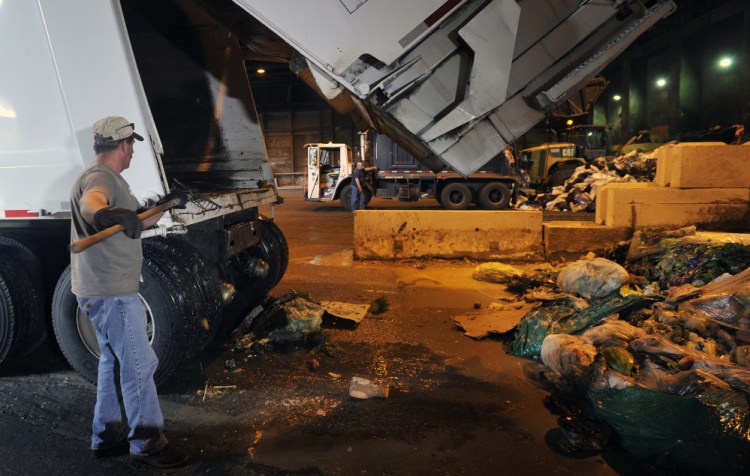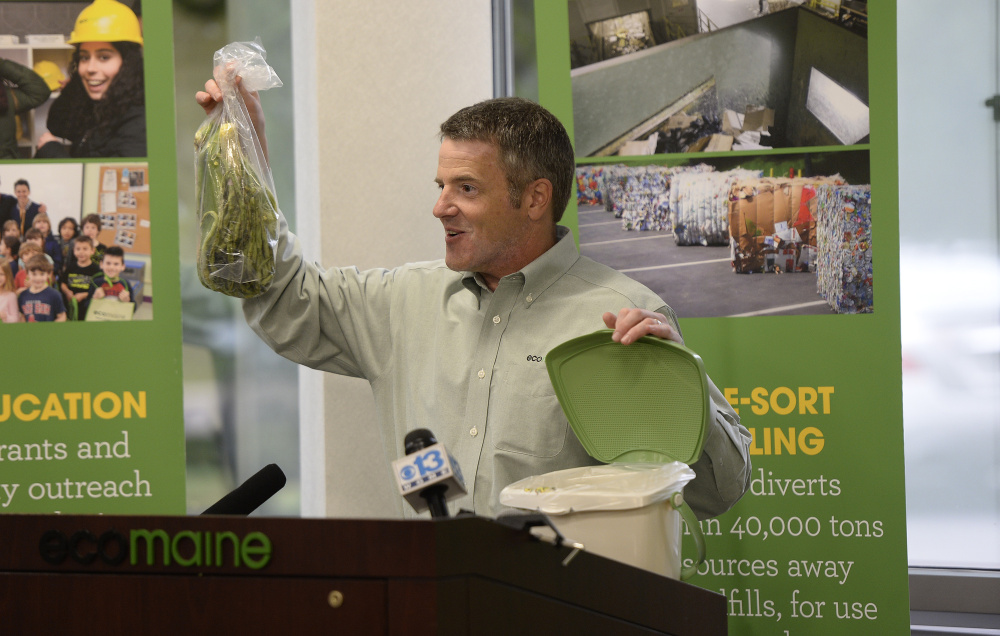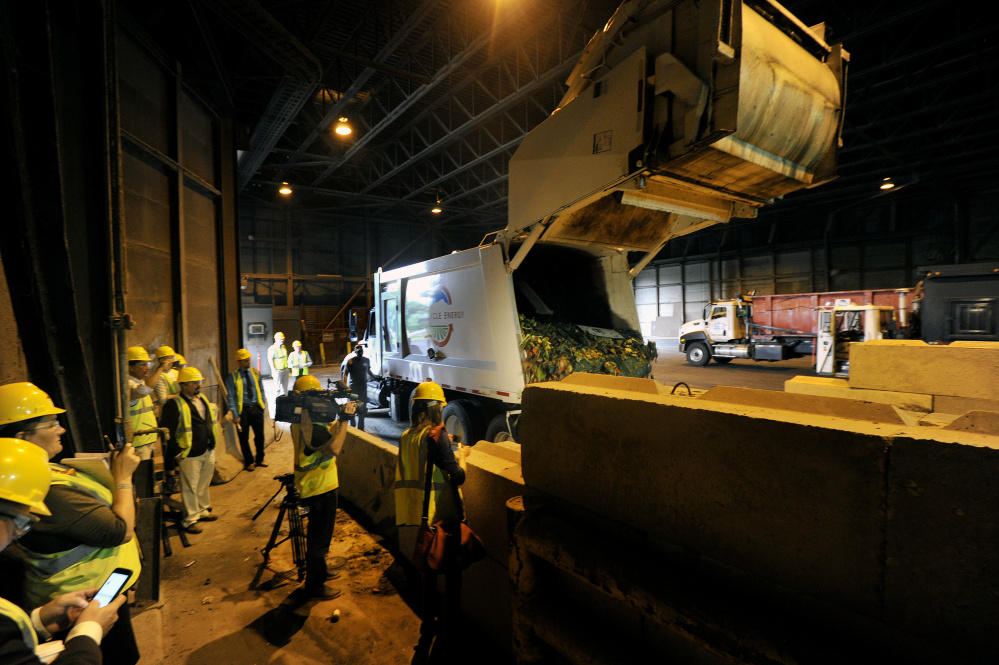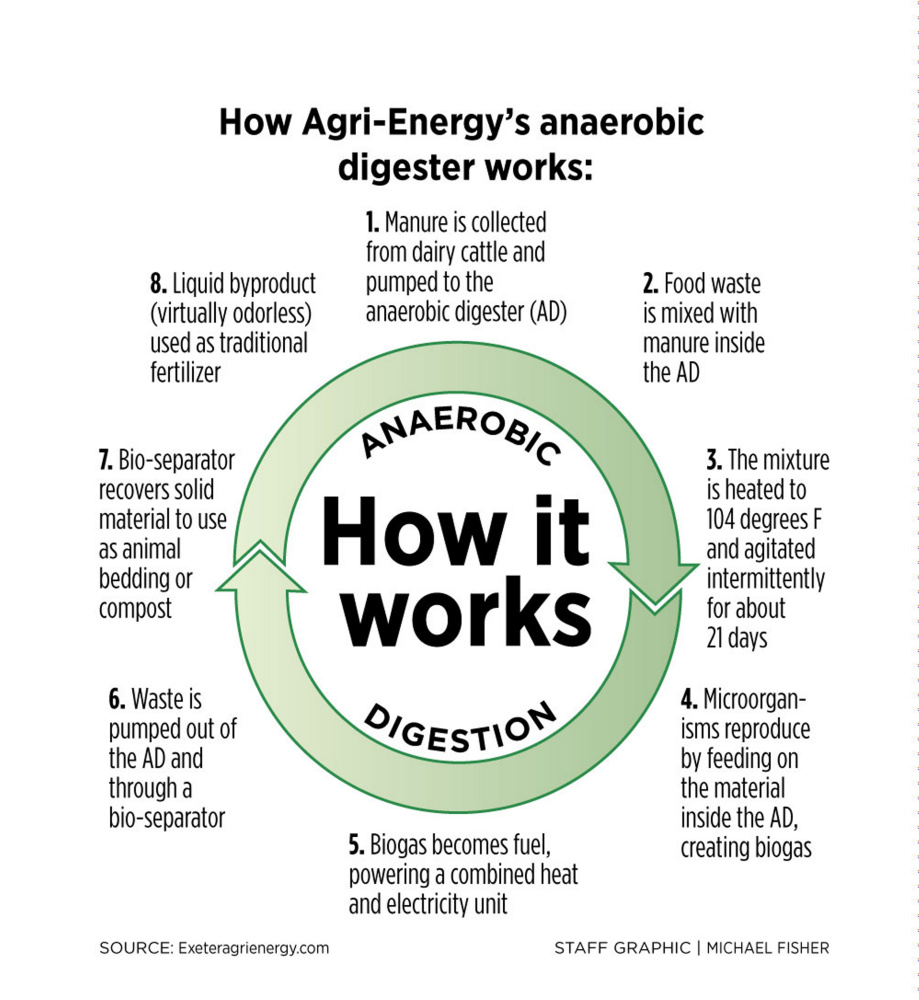A food waste recycling program launched Wednesday in Portland hopes to trigger the next big advance in southern Maine’s municipal trash business: collection of household kitchen scraps and other organic waste.
Kitchen scraps, expired produce and other food waste make up close to 30 percent of the trash that Mainers throw out, according to a 2011 University of Maine study, and removing these items from the waste stream is seen as a key way to reach a statewide goal to recycle half of the state’s waste stream by 2021.
But the lack of a transfer facility to consolidate and weigh food waste that could then be shipped for processing has prevented efforts to expand food waste recovery in the region, especially from towns and cities in the Portland area.
Ecomaine, a nonprofit solid-waste corporation collectively owned by more than a dozen southern Maine municipalities, aims to clear that hurdle and help the region join a small number of U.S. communities removing food material from the waste stream. Ecomaine’s Portland headquarters has begun collecting and storing food waste for delivery to Exeter Agri-Energy, which converts the waste into methane-rich gas used to produce energy.
Local officials compared the potential effect of the service to the big gains in recycling after the introduction of single-stream collections nine years ago.
“Having the infrastructure locally is a game-changer,” said Troy Moon, chairman of the ecomaine board and Portland’s sustainability coordinator. “Providing towns and businesses with an easy way to divert this material from the waste stream will help our communities be more sustainable and may help save them money.”
STRONG DEMAND FOR HOME SERVICE
The program initially is being aimed at commercial customers such as supermarkets, restaurants and food processors. But demand for residential service is strong, and with the infrastructure in place, municipal collection programs aren’t far off, ecomaine CEO Kevin Roche said at a news conference Wednesday morning.
“One of the reasons we felt this was the time we should launch the program was because there is demand on the edge of their seats waiting for this to roll out,” he said.
Ecomaine already has lined up food waste clients, including companies that currently are bringing organic waste directly to the Exeter plant.
On Wednesday, a trash truck deposited its load into a concrete containment area at ecomaine headquarters, adding to the approximately 12 tons of putrefying food already on the ground. The overpowering smell was too much for some people on a tour of the facility, and Roche said that’s why the plant is designed to trap odor inside.
Food waste recovery systems in other parts of the country have failed because of complaints about odor and waste runoff, he said. Ecomaine’s approach was planned for almost a decade to make sure it would succeed.
“The planning has been done such that there is little room for risk or error in this program,” he said.
The ecomaine plant processes about 175,000 tons of trash and about 45,000 tons of recycling. The facility might handle 5,000 tons of food waste in the first year, and Roche expects that number to increase over time.
Ecomaine will charge lower tipping fees for food waste – $55 per ton compared with $70.50 per ton for trash, creating an incentive to separate the materials and covering the cost of collecting and handling the new category of waste.
Agri-Energy has a system that offers a solution to the “ick factor” that prevents people from handling decomposing food, Roche said.
Food waste can be shipped inside clear plastic bags, and a machine at the Exeter plant separates food from the plastic. The bags will then be shipped back to ecomaine to be incinerated in its waste-to-energy plant, Roche said.
The Exeter plant mixes cow manure and food waste in an anaerobic digester that creates biomethane used to generate heat and electricity. Recovered solids are used as animal bedding at Stonyvale Farm, the second-largest dairy farm in the state, and liquids are used as farmland fertilizer. The plant generates about 1 megawatt of power, enough energy to heat 300 New England homes, the company says.
Dan Bell, waste solutions manager at Agri-Cycle Energy, the company’s transportation and collection wing, said the plant has the capacity to expand to produce 3 megawatts of electricity.
Ecomaine’s new transfer station and the possibility of municipal waste could help the company expand even further, Bell said.
“Where ecomaine is a member-owned facility, it is a really big step,” he said.
FOOD WASTE CURB PICKUP GROWING
Food waste collection is a growing trend in other parts of the country, although the waste often is destined to be turned into compost.
In 2013, there were about 183 towns and cities in the U.S. with curbside compost pickup, according to a report from the Massachusetts Institute of Technology.
Some big cities such as San Francisco, Seattle and Toronto have sophisticated collection systems, while smaller communities such as Hamilton and Wrentham, in Massachusetts, also have started programs and reported savings on waste costs, the MIT study states. Some individual communities in Maine have started municipal composting programs.
Towns and cities in the Portland area are eyeing municipal collection now that there’s a processing site in Portland. Julie Rosenbach, the South Portland sustainability coordinator, said the city is considering a pilot program. South Portland has a 28 percent recycling rate and wants to reach 40 percent by 2020.
“I think organics is going to be a key piece to that,” Rosenbach said. “We need to figure out how it will make sense for South Portland.”
A municipal food waste program is also on the table in Falmouth, where the town is looking to cut costs and modernize its trash and recycling program, said sustainability coordinator Kimberly Darling.
“If there are savings with tipping fees and we can take and enhance our services, that’s where we’re looking,” Darling said. “There are a lot of different avenues for this, that’s what makes it exciting.”
BUSINESS FOR PRIVATE COMPANIES
Private hauling companies also may benefit from the ecomaine food waste service.
Tyler Frank, president of Garbage for Garden, a private company that collects organic waste at the curb, said it already sends some of its waste to Exeter Agri-Energy and will be using the ecomaine facility.
Garbage to Garden started in 2012, and now collects 4,000 tons of organic waste from more than 6,000 customers in Greater Portland and Massachusetts. Most of the collected waste goes to composting farms around Portland, but some is transported to Exeter Agri-Energy. Transporting waste that far was a challenge, and Frank said that sooner or later a company would have established a food waste transfer station in the region to accommodate demand.
Now that ecomaine’s member communities might look more seriously at curbside collection, Frank sees an opportunity to grow with new collection contracts.
“I am seeing this as a boon. I hope to have a lot of conversations with town managers in the next couple weeks,” Frank said. “Increasingly, municipalities are going to be our customers, rather than households.”
Peter McGuire can be contacted at 791-6325 or at:
Send questions/comments to the editors.






